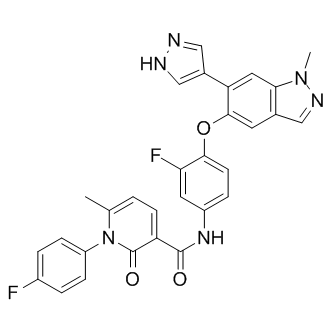| Cas No.: | 1206799-15-6 |
| Chemical Name: | Merestinib (LY2801653) |
| Synonyms: | MET inhibitor, LY2801653; LY-2801653; LY 2801653; Merestinib |
| SMILES: | FC1=C(OC2=C(C3=CNN=C3)C=C3C(C=NN3C)=C2)C=CC(NC(C2=CC=C(C)N(C3C=CC(F)=CC=3)C2=O)=O)=C1 |
| Formula: | C30H22F2N6O3 |
| M.Wt: | 552.53 |
| Sotrage: | 2 years -20°C Powder, 2 weeks 4°C in DMSO, 6 months -80°C in DMSO |
| Description: | Merestinib (LY2801653) is a type-II ATP competitive, slow-off inhibitor of MET tyrosine kinase with a dissociation constant (Ki) of 2 nM. |
| In Vivo: | Merestinib (LY2801653) demonstrates anti-tumor effects in MET amplified (MKN45), MET autocrine (U-87MG, and KP4) and MET over-expressed (H441) xenograft models; and in vivo vessel normalization effects. Merestinib (LY2801653) is a type-II ATP competitive, slow-off inhibitor of MET tyrosine kinase with a pharmacodynamic residence time (Koff) of 0.00132 min-1 and t1/2 of 525 min. Merestinib (LY2801653) treatment inhibits MET phosphorylation with a composite TED50 (50 % target inhibition dose) of 1.2 mg/kg and a composite TED90 (90 % target inhibition dose) of 7.4 mg/kg[1]. Merestinib (LY2801653) (20 mg/kg) reduces TFK-1 tumor growth significantly relative to vehicle control. Merestinib (LY2801653) inhibits the growth of intra- and extrahepatic CCC xenograft tumors[2]. |
| In Vitro: | Merestinib (LY2801653) demonstrates effects on MET pathway-dependent cell scattering and cell proliferation. The mean IC50 value (n=6 determinations) of Merestinib (LY2801653) for inhibition of MET auto-phosphorylation in HGF-stimulated H460 cells is 35.2±6.9 nM and the IC50 for MET auto-phosphorylation in S114 cells is 59.2 nM. Transfection with the MET variants confers growth-factor independence and treatment with Merestinib (LY2801653) inhibits growth of these MET variant clones with an IC50 ranging from 3-fold more potent (V1092I) to approximately 6-fold less potent (L1195V) compare with the growth inhibition of cells with the MET wild-type sequence[1]. Merestinib (LY2801653) (2, 5, and 10 μM) reduces the number of viable TFK-1 and SZ-1 cells in a dose and time dependent manner, and significant inhibits wound healing for TFK-1 and SZ-1 cell lines. Merestinib (LY2801653) inhibits cell invasion in TFK-1 and SZ-1 cells in a concentration dependent manner[2]. |

 To enhance service speed and avoid tariff delays, we've opened a US warehouse. All US orders ship directly from our US facility.
To enhance service speed and avoid tariff delays, we've opened a US warehouse. All US orders ship directly from our US facility.




















